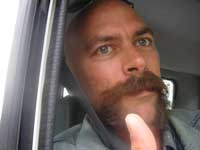It's Holy Saturday, the deep breath that observant Christians of the more liturgical sort take between Good Friday and Easter. Softball practice today was at 3 pm, so I had to excuse myself. Y'see, I'm participating in a Special Interest Group on S/M and Spirituality that Diabolique is doing for GMSMA. Pretty appropriate, I think, to set off on that journey today.
I'm really looking forward to it. It's exactly what I've found in S/M. It's a spiritual path. That sounds high-fallutin'. Let me explain. In the Eighth Century, a man named Benedict gathered around him a group of other men. They decided to live apart and pursue a holy life together. Benedict was a very bright guy, and he realized that after he was no longer around, these guys would need something concrete to continue this pursuit. So he wrote a Rule, governing how they would live. This was the foundation of monastacism in Western Christianity. I love the Rule of St. Benedict. During college, I spent a lot of time at a Benedictine monastery in St. Louis, Missouri. Benedict's chief insight was holding work and prayer in balance, Ora et Labora in the Latin. You can't work too much, or you neglect your prayers. You can't spend all your time praying, or else you tend to... well... go batty. So the two must be in balance. They bleed into each other. Hard, repetitive work, like tending vineyards, sets your mind free to wander. After an afternoon in the hot sun, sitting in a cool chapel and chanting ancient psalms comes as a welcome respite.
A few centuries later, a young Spanish soldier, Ignatius of Loyola, also gathered a group of men, fellow soldiers, around him. He took a sort of soldier's approach to spirituality, and devised what he called 'Spiritual Exercises' in order to guide one deeper and deeper into holiness. A lot of what he was doing involved meditation on passages from Scripture. I like Ignatius because he was very literal minded, as I am. So, his method of meditating on the Wedding Feast at Canaan, where Christ performed his first miracle by turning water into wine, would involve imagining yourself to be at the wedding feast. What are you doing? What are other people doing? Do you see Jesus there? What is he doing? What does he look like? How does the food and wine taste? What does it smell like? Is there music? What does it sound like? Ignatius founded a sort of Army of Jesus, what he called the Society of Jesus, and his Jesuits have sort of always been just about poised to take over the world.
Both of these, though very different in structure and temperament, contain a framework on which you can hang a rich, full life, a life that is lived deeply and fully.
I feel that S/M, if done right, holds the same possibilities. It's all there. The practice, study, community, and experiences that give easily to reflection. It's all there.
Subscribe to:
Post Comments (Atom)

No comments:
Post a Comment